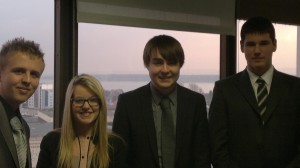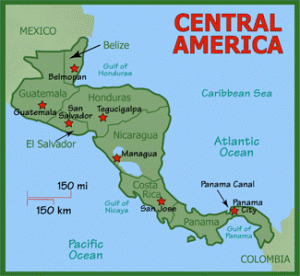 Bournemouth University is proud to be one of the sponsors of Dynamix, a Young Enterprise team based at Corfe Hills School in Broadstone. The Young Enterprise charity is a national initiative to forge links between schools and companies to inspire and equip young people to learn and succeed in business. Their flagship Company Programme enables 30,000 15-19 year olds run their own real companies for a year with help from business mentors. Dynamix are taking part in this programme and have put together the text below about their company:
Bournemouth University is proud to be one of the sponsors of Dynamix, a Young Enterprise team based at Corfe Hills School in Broadstone. The Young Enterprise charity is a national initiative to forge links between schools and companies to inspire and equip young people to learn and succeed in business. Their flagship Company Programme enables 30,000 15-19 year olds run their own real companies for a year with help from business mentors. Dynamix are taking part in this programme and have put together the text below about their company:
 Dynamix is made up of 14 A-level students, all aiming for success within the Young Enterprise competition. We, as a company, meet every Wednesday at the 288 group building for a business meeting, during these meetings we have set up a business and designed, prototyped and manufactured an innovative product; Folderboard. This is a fully customisable A4 ring binder with an integrated whiteboard allowing you to store what’s important and wipe away what’s not!
Dynamix is made up of 14 A-level students, all aiming for success within the Young Enterprise competition. We, as a company, meet every Wednesday at the 288 group building for a business meeting, during these meetings we have set up a business and designed, prototyped and manufactured an innovative product; Folderboard. This is a fully customisable A4 ring binder with an integrated whiteboard allowing you to store what’s important and wipe away what’s not!
 Folderboard is the first product within our Inspirationery brand, we are developing other products within this brand, these include an A5 Folderboard, a Folderboard with a pad of paper included and even an iFolderboard, a folder with an integrated iPad holder.
Folderboard is the first product within our Inspirationery brand, we are developing other products within this brand, these include an A5 Folderboard, a Folderboard with a pad of paper included and even an iFolderboard, a folder with an integrated iPad holder.
With this concept, we are competing against other companies like us in Young Enterprise competitions. This requires us to write a company report, organise a trade stand, create and deliver a presentation on our business and product and be interviewed on all aspects of our journey by a panel of judges. We have had great success with the most recent competition, performing well in all of these areas and moving through to the next stage in the competition.
 Dynamix has so much potential, we have received a lot of positive feedback from judges, we have the skills and the determination to go all the way through the many stages of the competitions to the international finals and we hope to do so.
Dynamix has so much potential, we have received a lot of positive feedback from judges, we have the skills and the determination to go all the way through the many stages of the competitions to the international finals and we hope to do so.
You can visit the Dynamix website here: http://inspirationeryuk.com/ where you can read more about the company and order their products.
We wish them the best of luck in the Young Enterprise competition!
 The EC is holding a two-day info day for universities, research institutions, Small and Medium-Sized Enterprises (SMEs) and companies who are interested in learning more about participating in the FP7 Work Programme 2013 transport theme. The two-day information event will be held on 18-19 July 2012 in the Charlemagne building, rue de la Loi 170, Brussels. The first day will inform potential researchers about FP7 and the new Transport Calls for Proposals under the 2013 Work Programme AND The second day will give participants the opportunity to network with potential project partners. If you are thinking of making a submission to this programme, then I cannot recommend your attendance at this enough! It will also be a key opportunity to network in general with people in similar research areas, so could well be worth attending even if you don’t intend to submit to this round. You can’t book online yet (see the hyperlink on info day for the page the booking will be released on to), but it’s good to block these dates out early if you want to attend.
The EC is holding a two-day info day for universities, research institutions, Small and Medium-Sized Enterprises (SMEs) and companies who are interested in learning more about participating in the FP7 Work Programme 2013 transport theme. The two-day information event will be held on 18-19 July 2012 in the Charlemagne building, rue de la Loi 170, Brussels. The first day will inform potential researchers about FP7 and the new Transport Calls for Proposals under the 2013 Work Programme AND The second day will give participants the opportunity to network with potential project partners. If you are thinking of making a submission to this programme, then I cannot recommend your attendance at this enough! It will also be a key opportunity to network in general with people in similar research areas, so could well be worth attending even if you don’t intend to submit to this round. You can’t book online yet (see the hyperlink on info day for the page the booking will be released on to), but it’s good to block these dates out early if you want to attend. The EC is holding a two-day info day for universities, research institutions, Small and Medium-Sized Enterprises (SMEs) and companies who are interested in learning more about participating in the FP7 Work Programme 2013 transport theme. The two-day information event will be held on 18-19 July 2012 in the Charlemagne building, rue de la Loi 170, Brussels. The first day will inform potential researchers about FP7 and the new Transport Calls for Proposals under the 2013 Work Programme AND The second day will give participants the opportunity to network with potential project partners. If you are thinking of making a submission to this programme, then I cannot recommend your attendance at this enough! It will also be a key opportunity to network in general with people in similar research areas, so could well be worth attending even if you don’t intend to submit to this round. You can’t book online yet (see the hyperlink on info day for the page the booking will be released on to), but it’s good to block these dates out early if you want to attend.
The EC is holding a two-day info day for universities, research institutions, Small and Medium-Sized Enterprises (SMEs) and companies who are interested in learning more about participating in the FP7 Work Programme 2013 transport theme. The two-day information event will be held on 18-19 July 2012 in the Charlemagne building, rue de la Loi 170, Brussels. The first day will inform potential researchers about FP7 and the new Transport Calls for Proposals under the 2013 Work Programme AND The second day will give participants the opportunity to network with potential project partners. If you are thinking of making a submission to this programme, then I cannot recommend your attendance at this enough! It will also be a key opportunity to network in general with people in similar research areas, so could well be worth attending even if you don’t intend to submit to this round. You can’t book online yet (see the hyperlink on info day for the page the booking will be released on to), but it’s good to block these dates out early if you want to attend.








 Research Councils UK (RCUK) is working with Universities UK, the Higher Education Funding Council for England (HEFCE), the Wellcome Trust and government departments to develop a concordat to support research integrity. Comments are now being invited on the draft concordat which is available on the
Research Councils UK (RCUK) is working with Universities UK, the Higher Education Funding Council for England (HEFCE), the Wellcome Trust and government departments to develop a concordat to support research integrity. Comments are now being invited on the draft concordat which is available on the 




















 April’s Café Scientifique – Should we help machines understand and respond to our emotions?
April’s Café Scientifique – Should we help machines understand and respond to our emotions? Postgraduate Research Experience Survey (PRES) 2024 – 2 WEEKS LEFT
Postgraduate Research Experience Survey (PRES) 2024 – 2 WEEKS LEFT Working with The Conversation: online training session – Wednesday 8th May
Working with The Conversation: online training session – Wednesday 8th May Apply for up to £1,000 to deliver an event and take part in a national festival of public engagement with research
Apply for up to £1,000 to deliver an event and take part in a national festival of public engagement with research MSCA Postdoctoral Fellowships 2024
MSCA Postdoctoral Fellowships 2024 Horizon Europe News – December 2023
Horizon Europe News – December 2023